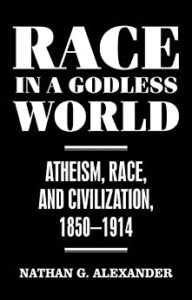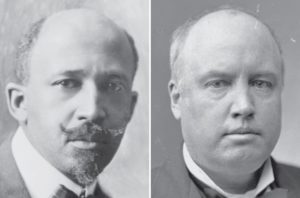Race in a Godless World: Atheism, Race, and Civilization, 1850–1914

BY NATHAN G. ALEXANDER
NYU PRESS, 2019
Nathan G. Alexander’s Race in a Godless World: Atheism, Race, and Civilization, 1850–1914 is a better book than its title, however accurate, might indicate. Well written and informative, the book rises far above the level of the academic thesis that lies at its heart. Perhaps more importantly, Race in a Godless World provides a solid building block in the still largely untold history of freethought and atheism.
The book begins by setting the stage for three intersecting strands of thought in the 1850s: freethought (atheism), rational science (soon to be dominated by Darwinism), and slavery. As Alexander frames it in his introduction,
Secular Enlightenment thought opened new avenues for thinking about race. It offered powerful arguments against inequality and slavery through the rhetoric of the equality of man, but it also served to emphasize the divisions between human races through the guise of rational science.
Indeed, throughout the 1850s freethinkers were generally anti-slavery. Freethinkers likewise found common cause with emerging science that suggested the world was much older than the biblical 6,000 years and therefore cast doubt upon the biblical account of creation starting with Adam and Eve—and, by extension, all of Christianity.
But following the course of science to oppose racism wasn’t as straightforward as atheists today would like to believe. While slavery was something most freethinkers, immersed in the ideas of humanism, found abhorrent, after slavery itself was eliminated and replaced by the Jim Crow racism of the late 1800s, the lines of moral suasion blurred. Evolution, in its early stages, would be used to make the argument that there was in fact a racial hierarchy of sorts, based on a rudimentary understanding of the science. (The author notes that Darwin himself didn’t hold to any such hierarchy but felt evolution suggested the common humanity of all. Other scientists were not so certain, however.)
While this did create some tension within freethinking circles, Alexander does a good job of illustrating how freethinkers finessed this problem through a combination of emphasizing that science was still unsettled on the point or, more unfortunately, by acquiescing to a certain level of racist thought that they put aside in favor of what they felt was the more pressing matter of fighting Christianity in general. It’s not always a flattering portrayal, but Alexander does a good job of examining the arguments around this issue, and generally finds that freethinkers, while far from being free of racial bias, at least tended to be more tolerant than the general public.

Freethinkers W.E.B. Du Bois (left) and Robert Ingersoll (right)
Alexander spends one interesting chapter examining the racism prevalent in the late 1800s against Asian people. Here, Western scholars in the freethought community generally came forward in a positive way, as they found much value in the history of a people that created a system of ethics and morality not based on Christianity or God. They viewed Confucius as a forerunner to secularization, calling him “our great reasoner.”
The late nineteenth century was one of conflicting attitudes towards segregationist racism within the freethought community. Most, following the impulse towards liberal humanism that had brought them to freethought, gave general support to the rights of black people, if still rooted in what we now see as some cringeworthy paternalism. The ideas and attitudes of such liberal thinkers as Robert Owen and John Stuart Mills both heavily emphasized that the character of a particular person was influenced most by circumstances, rather than by race.
But others, including Darwin’s own cousin Francis Galton, misused the ideas of evolution to support a tiered structure of what they regarded as scientific racism, or “eugenics,” as it came to be known. For instance, Galton’s close follower Karl Pearson argued that the near elimination of native tribes in North America was unfortunate but on the whole necessary, and, on balance, that it brought more good results than bad.
But as the twentieth century began, Alexander describes how freethinkers and atheists, such as the Scottish-born J.M. Robertson, started to confront more directly the problems of these racist views and began to instead present “the strongest arguments against racism that were rooted in an atheist perspective.” They were instrumental in organizing the 1911 Universal Races Congress in London that came out definitively against scientific racism. But as the history of this Congress was retold, Alexander notes, the role of atheists and freethinkers has been minimized.
In a conclusory chapter, Alexander explores what’s next for racism in a godless world. While generally positive, he raises a disturbing warning sign of atheism increasingly being part of one segment of the alt-right movement, again using a shallow understanding of evolution to underpin their racial beliefs.
Throughout the book, Alexander tells his story not only by exploring the ideas themselves, but also by highlighting those ideas through the lives and words of such freethinkers as Robert Ingersoll, Robert Owen, and W.E.B. Du Bois, as well as others, like Frederick Douglass, whose freethought sympathies were apparent if not firmly established. He also draws attention to a whole host of lesser-known characters whose stories deserve to be told and remembered, and he does so with verve and style. For instance, he highlights a satirical cartoon by Englishman W.P. Ball called “Noah’s Family,” in which each member is portrayed as being of a different race (thereby “explaining” why there are different races). Another minor player brought to life is James Morton, an American atheist born in 1870 who became a regular columnist for the Truth Seeker, where he “called upon Darwinian evolution to explain ‘that the human race is one in all essential characteristics’ and that therefore it was impossible to talk about a race being superior or inferior to any other.” Alexander’s research is wide, and his selections are illustrative.
As the history of freethought continues to be explored, books such as this are integral to understanding the importance and strength of atheistic thought in history. They also serve to show that it’s not a story that is all virtuous or without internal conflicts and controversy. But that comes with the territory. Alexander provides a needed and readable account of a particularly important transitional time in freethought, and how it dealt with the most important issue of the last two hundred years. If the title of the book piques your curiosity at all, it is a book well worth reading.
